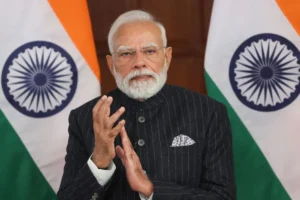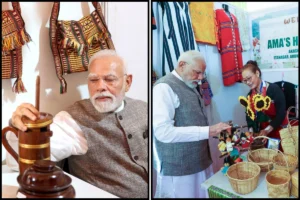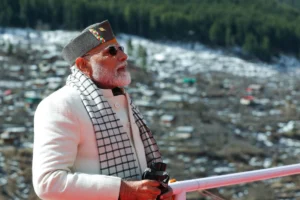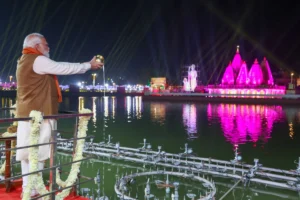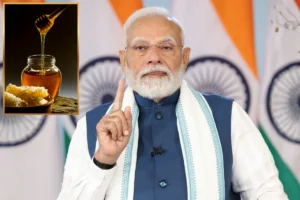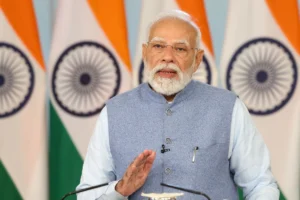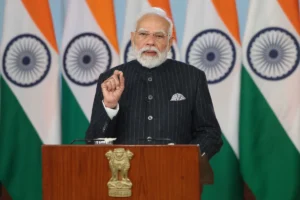
The Great Duplicity in Opposition's Stand
If Adani is so bad why have Ashok Gehlot, Bhupesh Baghel, Pinarayi Vijayan and Mamata Banerjee, signed multi-billion dollar investment deals with Gautam Adani?
The Opposition believes that the moment has finally arrived. The moment it had been waiting for the last nine years. A scam. A scandal. A controversy. Which can nail Prime Minister Narendra Modi. And sully his clean and pristine image.
After all the past failed attempts—Gujarat Riots, Sahara-Birla diaries, Rafale deal—they believe the Adani-Hindenburg saga can resurrect the Opposition. That belief has given a new lease of life in the rank and file of parties like Congress.
Nevertheless, there is a great irony in the whole affair.
If you look at the projects and deals that Adani lately got into, you will see the pictures of different Opposition Chief Ministers– Ashok Gehlot, Bhupesh Baghel, Pinarayi Vijayan and Mamata Banerjee– signing investment deals with Gautam Adani.
“Politics is something different, industry is something different. If you want to grow, you have to involve all. You have to divide the fruit for all. I don’t mind who is A, who is B, who is C, who is D,” said Banerjee at the Business Conclave organised by her government on July 4 in, 2022.
Adani Group has committed an investment of Rs 10,000 crore in West Bengal over a decade towards developing port infrastructure, data centres and undersea cables, centres of excellence in digital innovation, fulfilment centres, warehouses and logistics parks. The West Bengal government has recently approved Adani Enterprises to set up a hyper-scale data centre on 51 acres of land located in Bengal Silicon Valley in the New Town area on the outskirts of Kolkata.
In March 2022, Adani Ports and SEZ (APSEZ) won the bid for the West Bengal government’s greenfield deep-sea port project at Tajpur. APSEZ has offered a share of 0.25 per cent of gross revenue to the state government, which Mamata’s cabinet has approved. Another Group company, Adani Wilmar recently acquired a rice mill in Burdwan. The group has also obtained gas distribution licences in the state in partnership with Indian Oil Corporation (IOC).
The Adani Group is also investing $70 billion in clean energy. Gautam Adani’s vision is to reduce India’s dependency on fossil fuels and make the country a net exporter of clean energy. Most of Adani’s green energy investments are in Opposition ruled states.
Does Adani have projects only in BJP-ruled states?
Adani has five solar power projects in Rajasthan. Interestingly, the Gehlot-led Congress Government has given the nod for all these five projects, entailing an investment of over Rs 50,000 crore.
The irony in Congress’s stance gets nailed by the fact that its government in Rajasthan allotted land to the Adani Group for constructing solar parks.
Under Gehlot, the Congress Government in Rajasthan has allotted 9479.15 bighas (2397.54 hectares) of government land to Adani Renewable Energy Holding Four Limited for setting up a 1000 Mw Solar Power Project.
Under the ‘Invest Rajasthan’ outreach programme, state Chief Minister Ashok Gehlot received the biggest investment pledges from Gautam Adani and Mukesh Ambani.
The two As (to draw the Rahul Gandhi phraseology) together pledged more than Rs 1.68 trillion between December 2021 and March 2022 in Letters of Intent (LoIs) and Memoranda of Understanding (MoUs) available with the Rajasthan Government.
Reliance New Energy Solar Ltd made an investment pledge of Rs 1 trillion, Adani Green Energy Ltd of Rs 60,000 crore, followed by Adani Infra Ltd, Adani Total Gas Ltd, and Adani Wilmar Ltd at Rs 5,000 crore, Rs 3,000 crore, and Rs 246.08 crore, respectively.
So is the Ashok Gehlot Govt also in Adani’s pockets? Or has the allotment of land for Adani’s solar power project happened through a transparent bidding process?
The Adani Group has claimed that whether it is bagging power projects in states run by Congress or winning infrastructure projects in states ruled by BJP, Adani is winning the tenders because they are offering the most favourable terms to the public exchequer.
UPA, too, backed Adani’s projects
On March 13, 2014, Union minister of environment and forests (MoEF) M Veerappa Moily accorded “amendment to environmental clearance” nod for a Rs 7,020 crore-worth Adani Power Rajasthan Limited project and Rs 6,560 crore-worth Adani Power Maharashtra Limited project.
The two thermal power projects, Adani’s 3300MW plant in Tiroda, Maharashtra, and the 1330MW plant in Kawai, Rajasthan, had come to the MoEF on July 22, 2013, for amendment in environmental clearance. The power projects in Rajasthan and Maharashtra got environmental clearance in May 2011 and April 2010, respectively.
The projects got the green signal in March 2014 when Moily’s ministry issued the “amendment to environmental clearance”.
The foundations of most of the Adani businesses—from ports to power generation and transmission, city gas distribution, logistics and silos business—were laid down during the UPA era.
Today, Adani has assets and operations in more than a dozen Indian states. Some of them are ruled by BJP, others by non-BJP political formations.
Kerala’s CPM government is backing Adani to the hilt
A few years ago, the Govt of India passed a transparent tender to develop the Vizhinjam Port on a high level for which only Adani Group came forward. Vizhinjam is uniquely located close to the shipping routes between Asia and Europe.
India badly needs a deepwater port. Adani’s Vizhinjam Port can fill that need. It can be the deepest seaport in India and a trans-shipment hub for all of southern India.
The present communist government of Kerala is fully backing the Adani group.
Hundreds of workers of the Communist Party of India and BJP have been taking out joint processions in support of the Adani Group.
People of two opposite ideologies coming together in the national interest is not without reason.
Lok Sabha MP from Kerala and veteran Congress leader Shashi Tharoor who has also served in top positions in the United Nations, has supported the project.
He strongly raised this issue in Parliament as well.
The High Court of Kerala has also directed that construction work of the Vizhinjam Port should continue. The court said that political agitations could not obstruct development work.
The moral of this story is that one can afford to be anti-industry while in opposition. But when in power, every politician is confronted with the demands of the job to generate employment and create a favourable policy environment for business to flourish.
This explains why Rahul Gandhi, who has never occupied a position in government, can afford to lambast Adani-Ambani every waking moment of the day. On the other hand, Manmohan Singh, who was Prime Minister for ten years, has never once uttered a negative word against any industrialist or corporate group.
Going by the evidence of Adani’s importance for India’s infrastructure sector across all Indian states—whether ruled by BJP or the Opposition, one should not be surprised that the current opposition agitation on the Hindenburg report may soon fade out.










